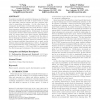37 search results - page 3 / 8 » The Minimum Information Principle for Discriminative Learnin... |
ICRA
2007
IEEE
14 years 2 days ago
2007
IEEE
Abstract— Categorizing visual elements is fundamentally important for autonomous mobile robots to get intelligence such as new object acquisition and topological place classific...
SIGIR
2010
ACM
13 years 9 months ago
2010
ACM
Generative models such as statistical language modeling have been widely studied in the task of expert search to model the relationship between experts and their expertise indicat...
JMLR
2011
13 years 22 days ago
2011
We propose a framework MIC (Multiple Inclusion Criterion) for learning sparse models based on the information theoretic Minimum Description Length (MDL) principle. MIC provides an...
ICML
2008
IEEE
14 years 6 months ago
2008
IEEE
Previous work has shown that the difficulties in learning deep generative or discriminative models can be overcome by an initial unsupervised learning step that maps inputs to use...
MLDM
2005
Springer
13 years 11 months ago
2005
Springer
In the context of large databases, data preparation takes a greater importance : instances and explanatory attributes have to be carefully selected. In supervised learning, instanc...

